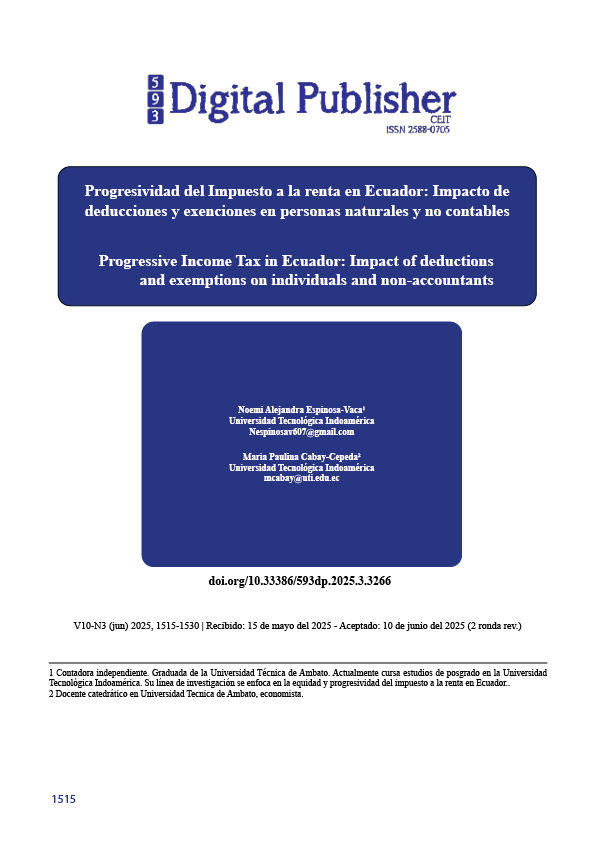Progressive Income Tax in Ecuador: Impact of deductions and exemptions on individuals and non-accountants
Main Article Content
Abstract
In Ecuador, many individual taxpayers who are not required to keep accounting records often face their income tax obligations without fully understanding the legal tools available to reduce their tax burden. This research emerged from the need to assess the real impact of deductions and exemptions on this group’s tax liability. The main goal was to analyze how much the tax burden changes when these fiscal benefits are applied versus when they are not. A qualitative approach was used, with an exploratory-descriptive design, based on document analysis and data collection through observation forms. The findings revealed a significant difference: those who apply available deductions pay less and are more compliant with their tax duties. In conclusion, tax knowledge empowers taxpayers. Making smart use of legal benefits is not about avoiding taxes—it’s about managing them wisely. For many Ecuadorians, this could mean the difference between financial stress and responsible tax planning.
Downloads
Article Details

This work is licensed under a Creative Commons Attribution-NonCommercial-ShareAlike 4.0 International License.
1. Derechos de autor
Las obras que se publican en 593 Digital Publisher CEIT están sujetas a los siguientes términos:
1.1. 593 Digital Publisher CEIT, conserva los derechos patrimoniales (copyright) de las obras publicadas, favorece y permite la reutilización de las mismas bajo la licencia Licencia Creative Commons 4.0 de Reconocimiento-NoComercial-CompartirIgual 4.0, por lo cual se pueden copiar, usar, difundir, transmitir y exponer públicamente, siempre que:
1.1.a. Se cite la autoría y fuente original de su publicación (revista, editorial, URL).
1.1.b. No se usen para fines comerciales u onerosos.
1.1.c. Se mencione la existencia y especificaciones de esta licencia de uso.
References
Caro Arroyo, J. M. (2020). Los modelos de tributación en Latinoamérica y su incidencia en la desigualdad. Revista Científica General José María Córdova, 18(31), 675-706.
Espinoza, A. M. R., Nina, E. D. M., & Dávila, G. D. (2020). Estrategias financieras sostenibles aplicadas ante situaciones de riesgo empresarial: un análisis bibliográfico. Revista de Investigación Valor Contable, 7(1), 79-90.
Bird, R., & Zolt, E. (2020). Diseño de políticas fiscales para países en desarrollo. Journal of Economic Policy, 35(4), 123–145.
Castro, F., & León, A. (2020). Comparación de sistemas tributarios en América Latina: enfoques de progresividad y eficiencia. Editorial Económica Andina.
CEPAL. (2022). Equidad tributaria en América Latina: Avances y desafíos. Comisión Económica para América Latina y el Caribe.
CEPAL. (2023). Informe anual sobre la situación fiscal en América Latina. Comisión Económica para América Latina y el Caribe. https://www.cepal.org/es/publicaciones
Creswell, J. W. (2020). Qualitative inquiry and research design: Choosing among five approaches (4th ed.). SAGE Publications.
Rädiker, S., & Kuckartz, U. (2021). Análisis de datos cualitativos con MAXQDA: Texto, audio, video. BoD–Books on Demand.
Fondo Monetario Internacional. (2021). Manual de diseño tributario progresivo en América Latina. FMI. https://www.imf.org/es/Publications
Gaspar, V., Jaramillo, L., & Wingender, P. (2021). Equidad fiscal en el siglo XXI. Documento de trabajo del Fondo Monetario Internacional.
Gupta, S., & Tareq, S. (2021). Reevaluación de los incentivos fiscales en economías emergentes. World Development Journal, 139, 105268.
Hernández, R., Fernández, C., & Baptista, P. (2020). Metodología de la investigación (7ma ed.). McGraw-Hill.
Hernández, R., Fernández, C., & Baptista, P. (2022). Metodología de la investigación cualitativa y cuantitativa (8va ed.). McGraw-Hill.
Loor, J., & Muñoz, E. (2022). La regresividad fiscal y la focalización de beneficios tributarios en el Ecuador. Revista de Estudios Tributarios, 6(1), 33–50.
Giesecke Sara Lafosse, M. P. (2020). Elaboración y pertinencia de la matriz de consistencia cualitativa para las investigaciones en ciencias sociales. Desde el sur, 12(2), 397-417.
Medina Rodríguez, O. (2023). La proporcionalidad y equidad tributaria en la determinación del impuesto sobre la renta en ingresos por salarios a una empresa de servicios del estado de Aguascalientes.
Miles, M. B., & Huberman, A. M. (2020). Qualitative data analysis: An expanded sourcebook (3rd ed.). SAGE Publications.
OCDE. (2021). Reformas fiscales en países de la OCDE 2021. Publicaciones OCDE.
Piketty, T., & Saez, E. (2020). Tributación progresiva en el siglo XXI. Quarterly Journal of Economics, 135(2), 553–609.
Salazar, D., & Martínez, L. (2021). Equidad tributaria y progresividad del impuesto a la renta en Ecuador. Análisis Económico y Social, 9(3), 55–70.
Sampieri, R. (2022). Metodología de la investigación: Fundamentos y aplicaciones (7ma ed.). McGraw-Hill.
Servicio de Rentas Internas. (2023). Normativa tributaria vigente en Ecuador. SRI.
Servicio de Impuestos Internos de Chile. (2024). Guía tributaria personas naturales. https://www.sii.cl
Servicio de Rentas Internas del Ecuador. (2024). Ley de Régimen Tributario Interno y su reglamento actualizado. https://www.sri.gob.ec
Stiglitz, J. E. (2020). The economics of public sector (4th ed.). W.W. Norton & Company
Superintendencia Nacional de Administración Tributaria del Perú. (2024). Régimen del Impuesto a la Renta. https://www.sunat.gob.pe
Tanzi, V. (2022). Finanzas públicas en países en desarrollo. Routledge.
Villacrés, M. (2021). Impacto de las deducciones tributarias en los ingresos fiscales del Ecuador. Revista Economía Pública y Fiscal, 10(1), 44–59.
Honores, J. L. C., & Llanto, J. Q. (2021). El uso del enfoque del estudio de caso: Una revisión de la literatura. Horizontes. Revista de Investigación en Ciencias de la Educación, 5(19), 775-786.
Segura Medina, J. D. (2021). El principio de equidad tributaria en el tratamiento diferencial en el impuesto de renta entre sindicatos y sociedades (The Principle of Tax Equity in the Differential Treatment of Income Tax between Unions and Societies). Revista Derecho Fiscal, (19).



